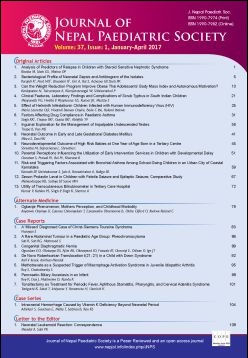Factors Affecting Drug Compliance in Paediatric Asthma
DOI:
https://doi.org/10.3126/jnps.v37i1.17201Keywords:
Paediatric asthma, complianceAbstract
Introduction: Childhood asthma is an immensely important chronic disease in children with increasing prevalence worldwide. Inhaled corticosteroids and bronchodilators are the key drugs in asthma therapy.
Material and Methods: Compliance of childhood asthma was assessed at a tertiary care centre to find out the percentage of compliant Vs noncompliant patients and the reasons for the latter. If the patient had attended at least nine visits (> 75%) the previous year he was labelled compliant and those with less than six visits (<50%) were put in the non-complaint group.
Results: Of the 374 patients attending the asthma clinic, 60 were randomly selected for the study of which 53 finally participated. In this study the compliance was 47% and gender predilection did not affect compliance. The distance a patient had to commute to reach the hospital and the mother’s education did not have any influence on the compliance. Older asthmatics exhibited better compliance in our study.
Conclusion: Forty percent of our patients were compliant to regular use of prescribed medicine. Older age of the patients and care giver`s awareness about asthma were the two factors which are statistically significant in compliance with drug therapy in asthma. Gender of the patient, academic qualification and distance from the hospital did not have a significant effect on compliance.
Downloads
Downloads
Published
How to Cite
Issue
Section
License
Authors who publish with this journal agree to the following terms:
Authors retain copyright and grant the journal right of first publication with the work simultaneously licensed under a Creative Commons Attribution License that allows others to share the work with an acknowledgement of the work's authorship and initial publication in this journal.
Authors are able to enter into separate, additional contractual arrangements for the non-exclusive distribution of the journal's published version of the work (e.g., post it to an institutional repository or publish it in a book), with an acknowledgement of its initial publication in this journal.
Authors are permitted and encouraged to post their work online (e.g., in institutional repositories or on their website) prior to and during the submission process, as it can lead to productive exchanges, as well as earlier and greater citation of published work (See The Effect of Open Access).



